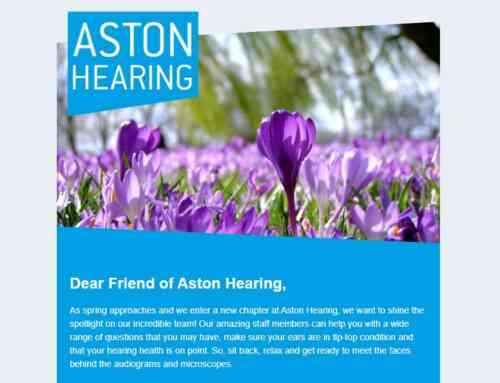
As part of Tinnitus Awareness Week on 4th to 10th February, local audiology experts Aston Hearing are calling for greater awareness of the debilitating condition because of the isolation it causes for many sufferers. About 30% of people will experience tinnitus at some point in their lives, with 10% experiencing persistent tinnitus.
Duncan Collet-Fenson, Audiologist and Managing Director of Aston Hearing in Princes Risborough and Amersham says: “The effect that tinnitus can have on your mental health can be truly debilitating, partly because it is so hard to explain it to someone who hasn’t or isn’t going through it. We have had clients across the region whose health, relationships and work lives have been adversely affected by the constant hearing sensation, similar to a persistent ringing, whooshing, humming or buzzing noise.”
Generally, tinnitus is more commonly found in those who already experience hearing loss or hearing problems, but it can affect anyone including children. Tinnitus can be experienced in one or both ears.
“Tinnitus mostly occurs as a result of damage to your ears, so it is vital to take care of your hearing, in the same way that you would protect your eyes. Try not to expose yourself to frequent bursts of loud noises and make sure not to listen to music on your headphones too loudly.”
Nikki Magrath from Amersham experienced tinnitus during a period of total deafness and says: “It was by far the worst part of the whole experience. I expected total deafness to mean living in a silent world, but the reality was totally different. It was distressing to have all conversation and sounds replaced by a raging machine noise inside my head.”
The most common cause of tinnitus is damage and loss of the tiny sensory hair cells in the cochlea of the inner ear. This tends to happen as people age, and it can also result from prolonged exposure to excessively loud noise. Factors which are known to influence the onset of tinnitus in some people include extreme fatigue, stress, loud environments, as well as many medical conditions such as ear infections, a perforated eardrum, and glue ear. Hearing loss may coincide with tinnitus.
There is currently no cure for tinnitus, but recent research has suggested that we may be closer to a cure than ever before. Some possible cures that are being developed including implanting an electrode into the neck near the vagus nerve so the patient listens to specific tones, which are paired with the electric pulses emitted from the electrode, causing a type of distraction to diminish the hyperactivity in the part of the brain which is causing the tinnitus. Alternatively, Tinnitus Desensitisation Therapy finds ways to redirect your brain’s attention away from the tinnitus so that you become less aware of the symptoms.
Duncan Collet-Fenson says: “Although research for these studies are still in their infancy, they have shown promising results. We hope that in the next few years these treatments may be available to everyone suffering with this condition but in the meantime, we need to talk about tinnitus and for those who need it to get help.”
Duncan Collet-Fenson’s top tips to deal with tinnitus:-
- Seek Help – Tinnitus is a complex condition and the best approach is to firstly quickly seek specialist audiology support either via your GP or privately to obtain advice and information on how to help manage tinnitus and its side effects.
- Counselling – Since tinnitus is very closely related to emotional stress counselling can often help, especially when tinnitus is significantly impacting your mental health and well-being. Studies have shown that those who usually suffer from short-term tinnitus are likely to be experiencing high levels of stress during that time period.
- Hearing Devices – It is estimated that 80% of tinnitus cases are accompanied by some degree of hearing loss. Hearing aids enhance the sounds you want to hear, such as voices and music, which can appear to lessen the noises associated with tinnitus.
- Sound Therapy – Tinnitus is usually more noticeable during the evening whilst lying in bed when it’s quiet, so other background noises are known to aid sleep include a ticking clock, soft music, pleasant white noise or a quiet television.
- Speak to someone – Tinnitus can at times be very trying on our mental health. Tinnitus sufferers can feel alone and distant from those who hear normally. Talk to your friends, family and colleagues about how you feel, which will also help them better understand your situation. Sometimes joining a specialist tinnitus forum may help so you can talk to others going through the same thing.
- Getting used to it – It is much easier said than done but if your tinnitus doesn’t go away then most likely it will be something you get used to living with. Get help and take all the time you need. Tell your school or workplace so they can understand how to help you. If you are studying for example you may be given longer time to do your exams.





